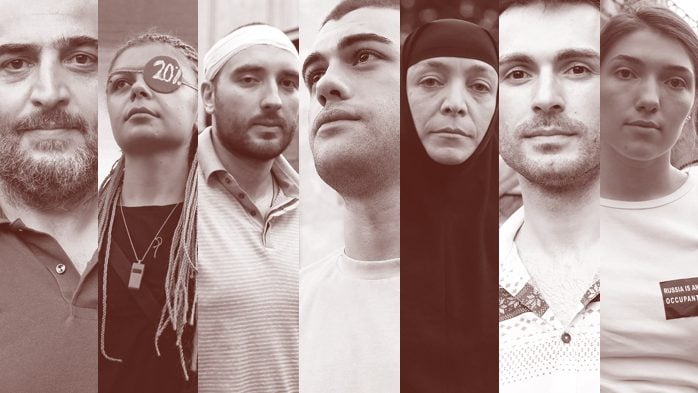Faces of Protest: People who animate Georgia now
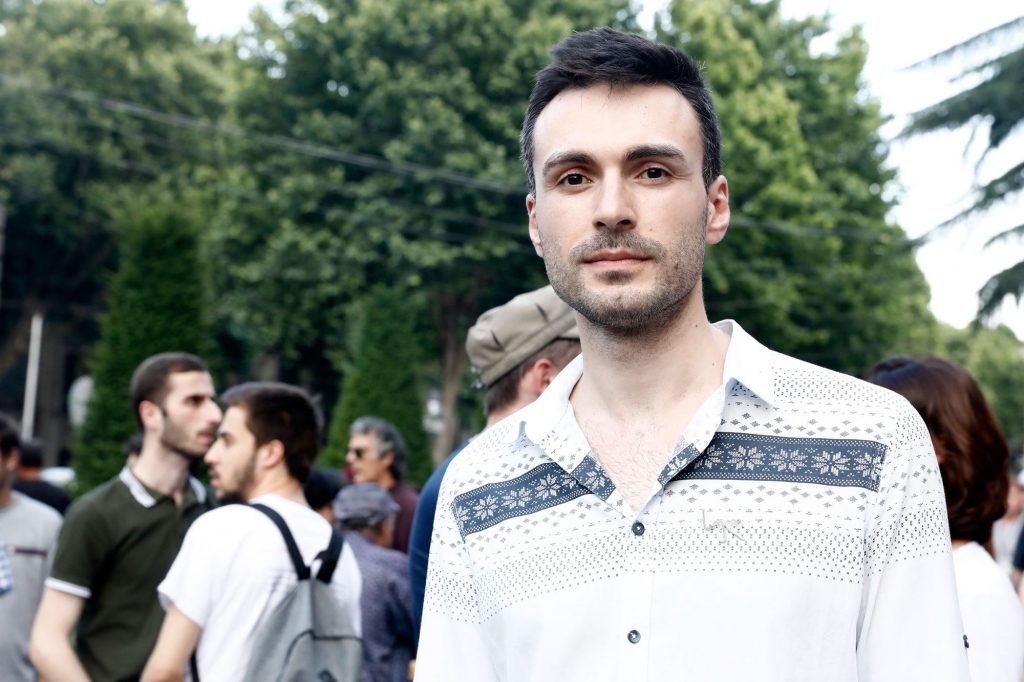
Shota Digmelashvili
Shota Digmelashvili is a co-founder of non-governmental organization Governance Monitoring Center. He manages a media project Waste Detector, investigating government spending. Shota is an executive editor of Forbes Georgia.
“Since the Russian-Georgian war and the change of government in 2012, Georgia’s dependence on Russia has been increasing in economic sphere and in energy sector. Though the two countries were at war and Georgians died during this war, a good-knows-what parliamentary assembly is suddenly being held in Tbilisi with member of Russia’s Communist party comes to Georgia and we see him sitting in Georgian Parliament Speaker’s chair. This was the trigger that brought people to the street.
Initially, people were calling for resignation of whoever was responsible for the Russian MP’s behavior [the Georgian Parliament Speaker], but the government dispersed the rally using barbaric methods. Police officers opened targeted fire at young people, journalists; there are people who were mutilated, who lost their eyesight. About 300 activists were arrested and part of them are still in custody.
We, the civic society, are holding the rally and have three demands: to punish the guilty, to release the innocent and to move to the proportional electoral system, that will help us have a normal representative democracy.
This rally goes beyond any partisan interests, but in its essence, it is of course political. We offered all parties to use our platform. People received some politicians warmly, while others – less so. But that does not matter, because our gathering is very representative [of the Georgian society].”
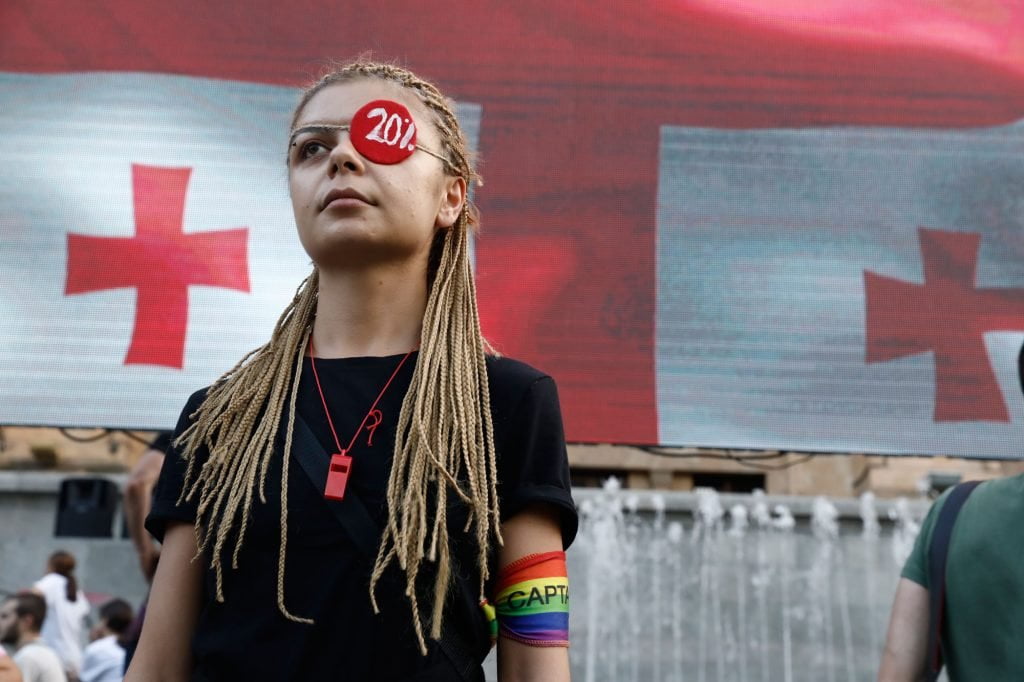
Salome Barker
Salome Barker is a journalist with ten-year experience of working in social media. Salome is in charge of public communication and digital marketing at various companies.
“We have a political crisis in the country and its primary cause is an informal ruler, who decides things instead of us.
Who are we? We are nobody and simultaneously, everybody. There is myself, my friends are here, we have a Facebook group. We are politically active citizens. We are not members of any political party, but we cooperate with all pro-Western opposition parties so that this rally does not remain a simple protest, but is translated into concrete change, including holding of 2020 parliamentary elections through the proportional system – so that we avoid usurpation of power by force that we may never be able to change [democratically] afterwards. The entire opposition spectrum agrees on this and we also share this demand. We would like to see our next government to be a coalition government, so that the practice [of super-majority rule] of over 25 past years, finally ends.
The name of our Facebook page sounds a bit ambitious: “Society for Spreading Freedom”, with a reference to the “Society for Spreading Literacy in Georgia” initiated by [19th century writer, civil leader and activist] Ilia Chavchavadze. but people do not know us by this name. They know us individually – Shota Digmelashvili, Salome Barker, Mariam Bajelidze, Zaza Abashidze and others. We are standing here. A lot of people, who are members of our Facebook group, helped us with donations: we used this money to print banners, to buy whistles and water. NGOs are also helping.
Our podium is open to everyone. Any person, who has something to say to to Bidzina Ivanishvili in his palace, will be given this opportunity.
We know that the government does not like what is happening here, but we do not intend to stop and our main demand will remain unchanged: they should immediately start working on how to change the election system by 2020.”
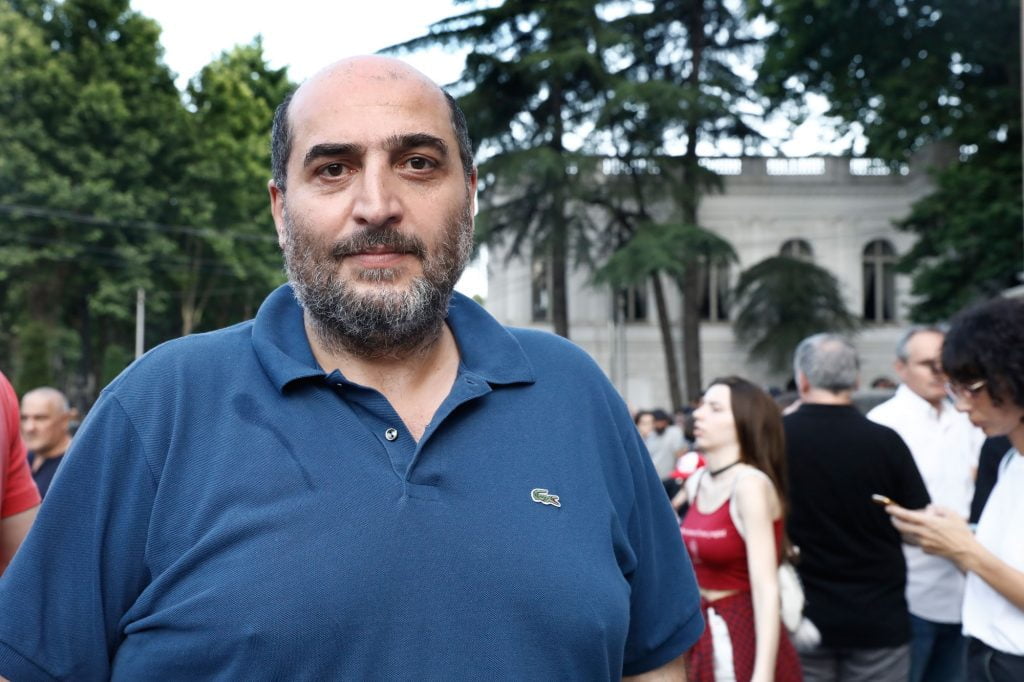
Misha Mshvildadze
Misha Mshvildadze is a scriptwriter, producer and TV host. Presently, he hosts a comedy/news show “Almost Every day” on Channel 3.
“It was most painful was to realize that apart from having a reckless enemy, we apparently also have the collaborationist government. This is how everything started. This is what we were protesting when our police fired at us. 23 people stay in hospitals with two of them are fighting for their lives.
The first rallies began in Georgia in 1988. I was 14 years old then and I was coming down from my place to observe them. The same struggle continues now: for the independence and “de-Sovietization” of Georgia. We want to build a free society, where we will live normally and try to be happy through fair distribution of wealth created by whatever is within our possibilities.”
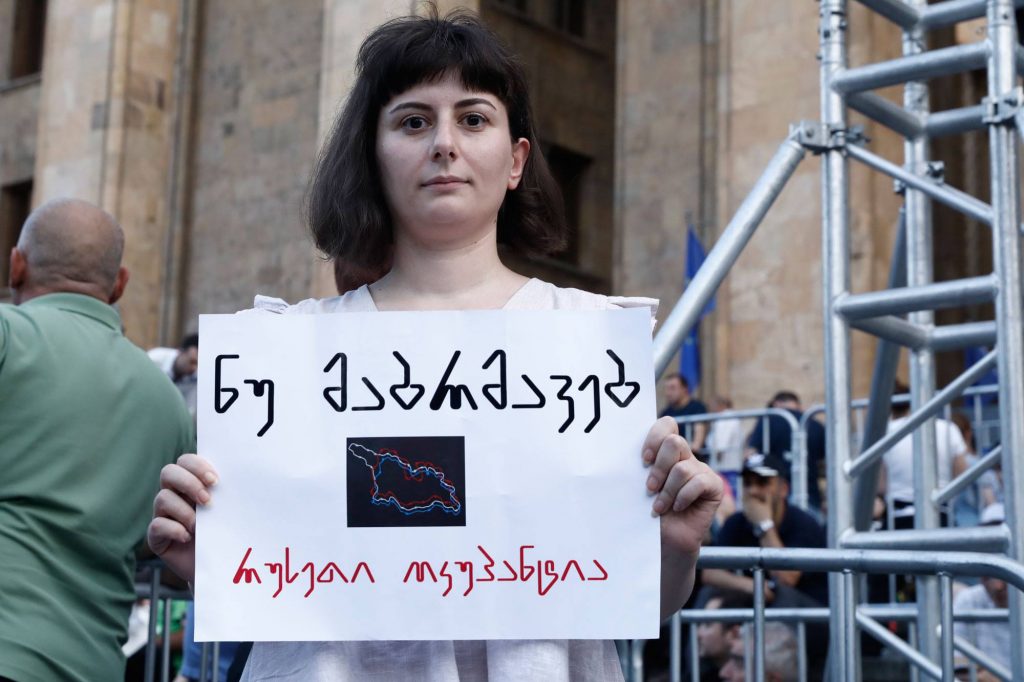
Nino Chelidze
Nino Chelidze has a 12-year experience of working in civic journalism and is a member of NGO Civic Journalism Club.
“I was on my way to work, as usual. But then I saw the photo of that Russian Communist MP sitting at the head of the Georgian Parliament, occupying the place of the the second highest ranking official of my country, in the Parliament chamber where Georgia’s independence was declared. I got off the bus and went straight to the rally.
I lost a friend during the 2008 Russian-Georgian war, he died as a hero. Since then, I have been constantly protesting Russian occupation. I felt humiliation when I saw the Russian lawmaker in the Georgian Parliament.
I have a brief message to everyone: we will never tolerate occupation, never.
Another thing that I am strongly protesting is violence against journalists during the dispersal of the rally. When you fire at a person, who holds a microphone and a camera in his hands?! That is an upper margin of political inadequacy.”
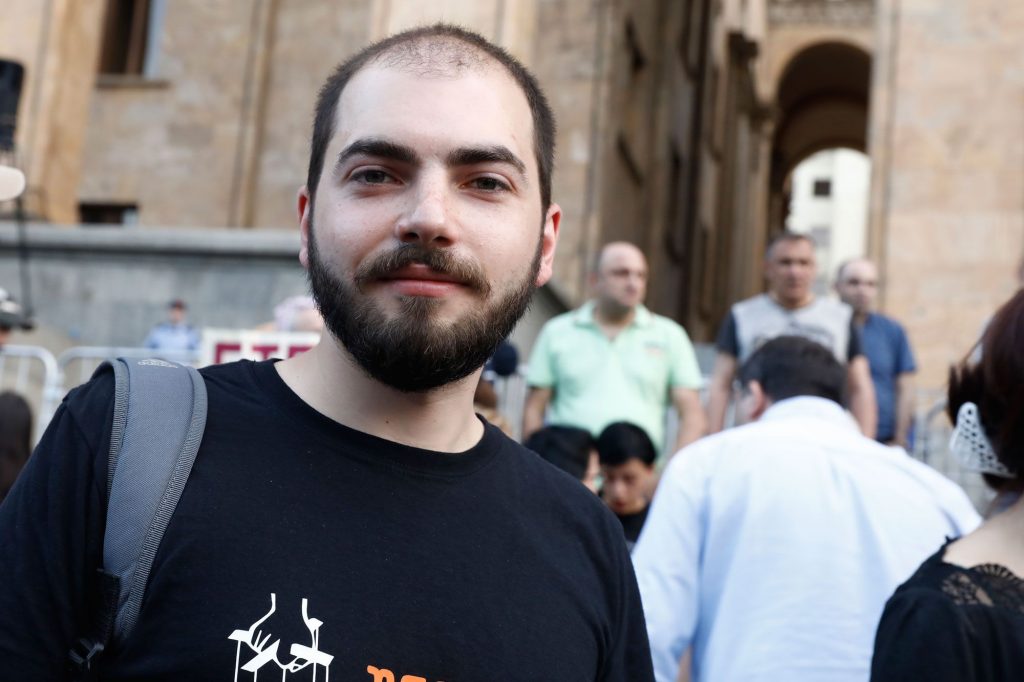
Giorgi Noniashvili
Giorgi Noniashvili, along with one of the leaders of the rally, Shota Digmelashvili, is co-founder of media project Waste Detector. In addition, Giorgi is a lecturer and researcher of School of Law at Ilia State University.
“20% of Georgian territory is occupied by the Russian Federation. Naturally, it is degrading for a lot of Georgian citizens to see the Georgian government offer the chair of the Parliament Speaker to one of Russian MPs.
This was what triggered the initial protest, that the government failed to measure how problematic such decision was in the context of occupation, soft power and hybrid warfare. Later, when the wave of protests intensified, the government actually had two choices: either to raise the issue of resignation of responsible persons or to disperse the protesters.
They chose the second path – they raided the protest, which only served to further intensify the protest, since the Georgian people, protesters saw, that that the government chose to defending an occupier MP, to protect the responsible officials over protecting peaceful manifestation of the Georgian people.
Current protests differ from those of past 20 years, because there is no narrow, partisan confrontation here. Civil society, ordinary citizens showed up, we offer them free rostrum.
People say two things: first, the government should not, figuratively speaking, let Russia sit in our seat of authority, that is humiliating for the Georgian people. And second, the government should not disperse citizens only because these citizens have justified demands.”
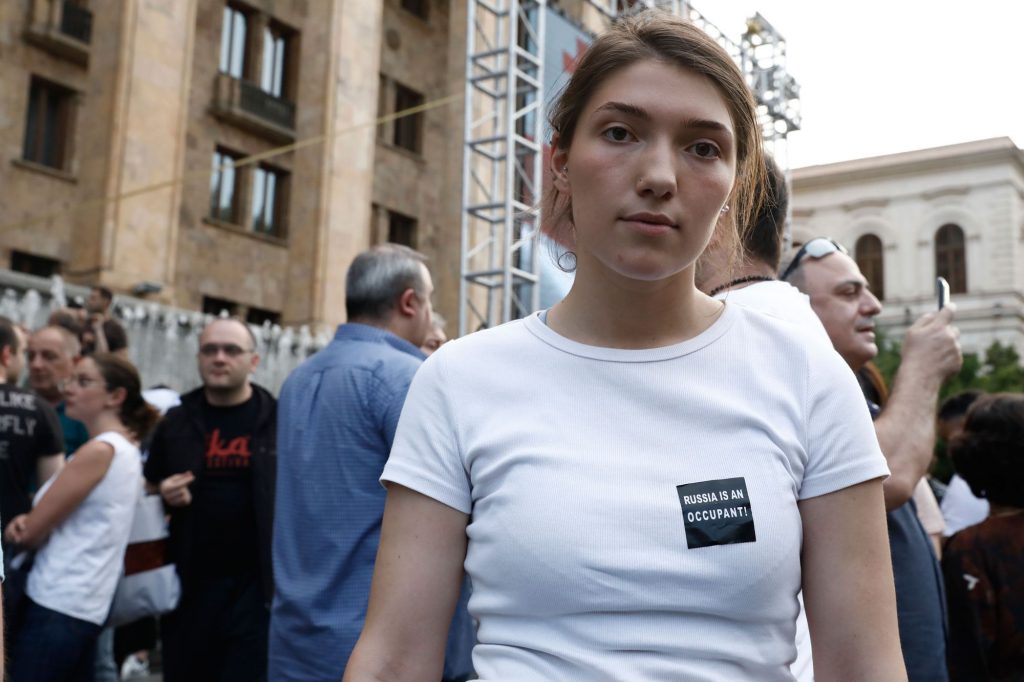
Tamar Arveladze
Tamar Arveladze is an activist of public movement “Russia is an occupier.” The movement unites young people who hold protest rallies against occupation of Abkhazia and Tskhinvali Region. Rallies are held in various cities of Georgia, as well as near the occupation lines.
“Protest started with dispersal of anti-occupation manifestation, and the youth, people who gathered at this rally will not leave this without response.
We represent self-organized civic associations – “Russia is an occupier,” and “Society for Spreading Freedom” – we are doing everything on our own, with the help of our supporters.
We will not break up this rally until the government meets our demands. Our rallies will be permanent and we will bother the government until it understands that people will not tolerate occupation. Georgian people will not tolerate either occupation or the government, which tolerates occupation.”
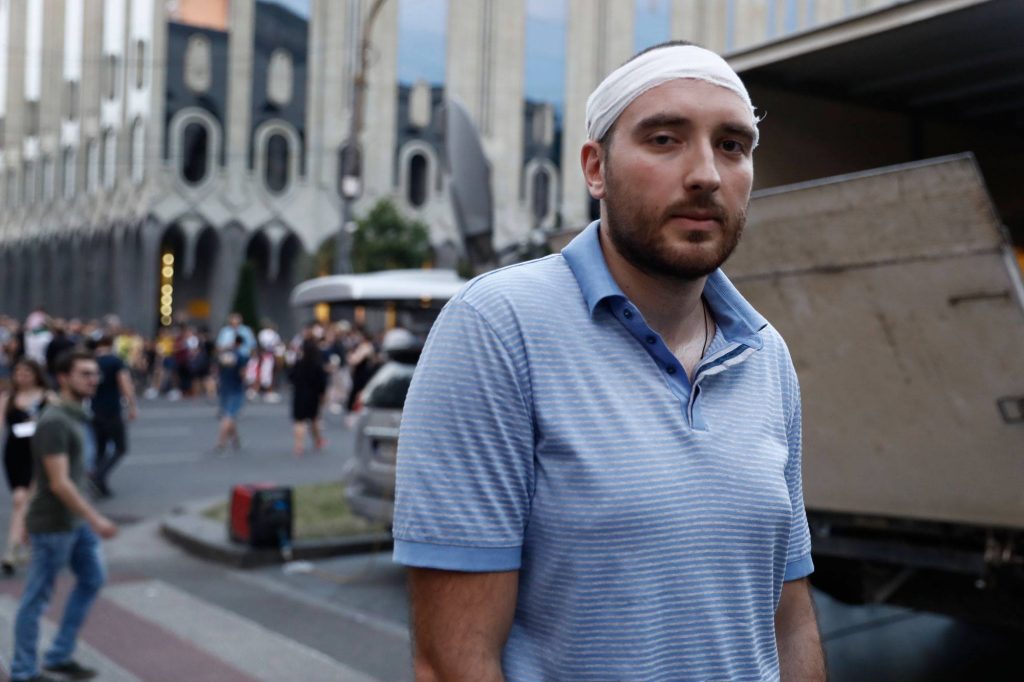
Irakli Pavlenishvili
Irakli Pavlenishvili is a human rights activist who was among those Georgian citizens who participated in the anti-occupation rally on June 20-21 and sustained injuries after riot police dispersed protesters.
“I came to the rally because I felt insulted with what has happened. It insulted not only me, but it insulted our national dignity, when one of the servants of the occupying country, of imperial regime, was offered the chair of the Parliament Speaker.
To tell the truth, I expected some incidents at the rally, but I really did not expect such a punitive measure against those people, who simply did not tolerate an insult to their national dignity.
Use of such disproportionate force is a show of government inadequacy and makes me believe that everything was done to please Russia and MP Gavrilov. The Georgian state should stand on our side rather than act to please the Russian Empire.
We have all the necessary levers to finally distance our country from the Russian orbit. I believe that our generation will manage to do it.
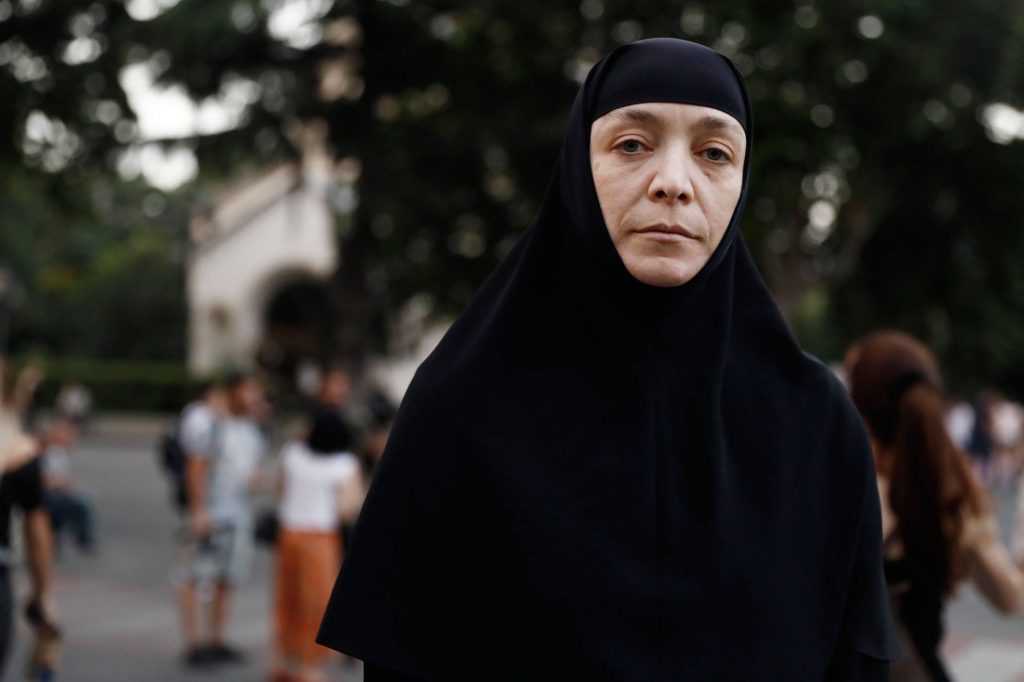
Sister Sidonia
Over the past years, Nun Sidonia has been actively supporting human rights and equality. Last year the Tolerance Center under the Public Defender awarded her with the title of Tolerance Supporter. The Georgian Orthodox Church criticizes and distances itself from Sister Sidonia’s public statements.
“We shall stand where the nation’s problem is.
I had often had the feeling of the lack of oxygen lately; freedom was no longer in the air, there was no positive charge, and – suddenly – the free will of young people shone through like a diamond.
They have no fear, they are absolutely free in their ideas; they know exactly what they want. I am sure that it is not easy to defeat them and nobody will be able to deprive us from what is most valuable for us.
Most important is to maintain unity and the independence of our state.”
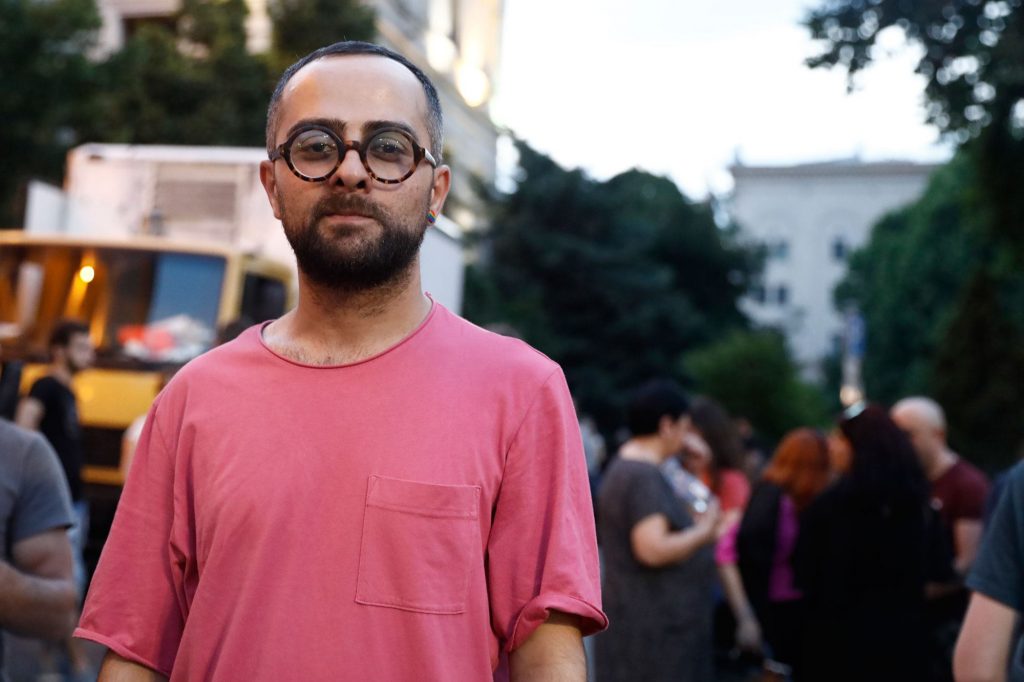
Giorgi Tabagari
Giorgi Tabagari is an expert in European studies and EU foreign policy. For years, he has been actively involved in protecting LBGT rights. In 2019, Giorgi and his associates founded non-governmental organization Tbilisi Pride, which planned to hold the first-ever Pride Parade in the capital on June 23, but had to postpone it, joining the protests.
“The government, which told us, the organizers of Tbilisi Pride, several days ago that it would not be able to erect [crowd control] barriers and to use force against the radical groups, has now used force against its own citizens for the sake of some Gavrilov. Over 200 people sustained injuries.
This is exactly where the crux of the problem lies – pro-Russian forces proved more important to the government than the lives and welfare of its own citizens.
Occupation and use of excessive force are the issues which directly concern us, ordinary citizens. I feel obliged to be here and to stay next to civic activists.”
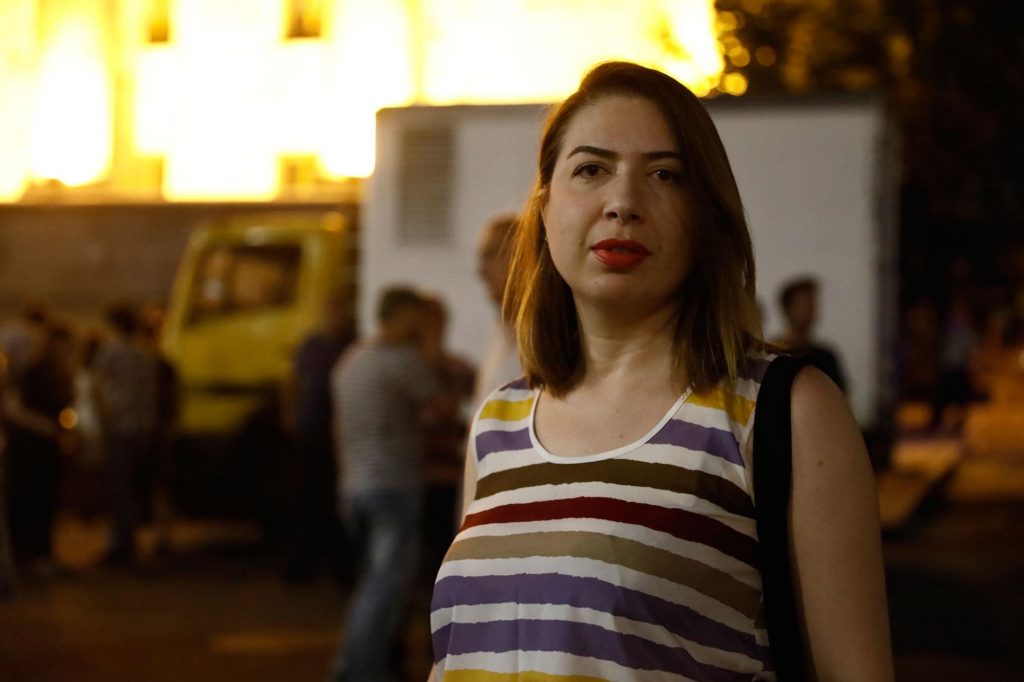
Ida Bakhturidze
Ida has been engaged in feminist activism since 2011. Now she is working for WECF – Women in Europe for a Common Future’s Georgian office as a Gender Programme Coordinator. She is one of the authors of the platform “Women from Georgia”.
“I am joining this rally and share its demands today because the time has come for everyone to learn to assume responsibility. The government, who allows crime to happen, should pay the political price for its actions and in this price involves resignation of specific officials.
The opposition also carries the responsibility for not useing the protest of people for narrow partisan interests. We are not standing here for the sake of any political leader. We need systemic changes, we need the governments that will be changed through elections and balanced out by institutions.
We will not allow any coup again in the capital of this country, I am sure of this; we are the generation, who saw how their parents were confronting each other, how they failed to build a democratic country. Their experience, their mistakes and our experience helped us understand what we need to do today.
I think, it is important that people, who have gathered here, understand that they are doing politics, even as they are distancing themselves from particular political parties. It would be a a great mistake if we were to pursue this protest through insulating ourselves from political parties. Once the changes are made in the election system, the political process would continue inside the Parliament. Therefore, we cannot continue this struggle without politicians, no matter whether we like them or not.”
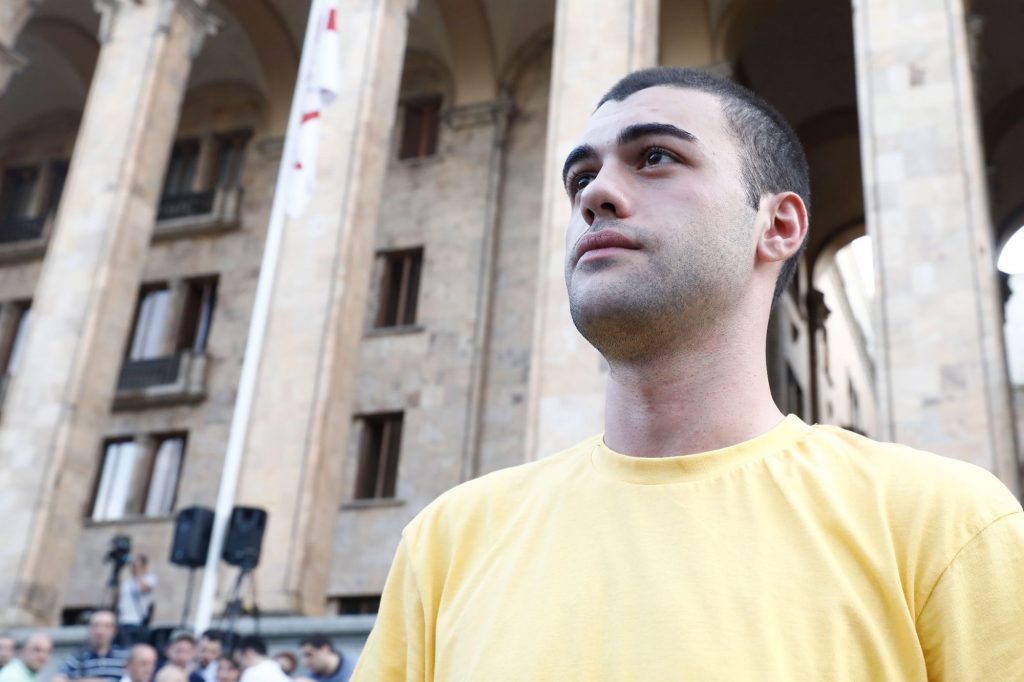
Nodar Rukhadze
Nodar Rukhadze is an activist of public movement “Russia is an occupier”. The movement unites young people who hold protest rallies against occupation of Abkhazia and Tskhinvali Region. Rallies are held in various cities of Georgia, as well as near the occupation lines.
“We witnessed that the Georgian government was trying to normalize relations with Russia over the past seven years; but in the end, we saw that the entire system created over the past 7-8 years came crushing down because of one incorrect and fundamentally unacceptable step.
This became the source of inspiration for the entire civic movement that prompted young people, the elderly, politicians, civic activists, journalists, teachers to take to the streets four days ago and protest the collaboration of our government with the government of occupying Russia. In response, our government made the most harmful and treacherous decision: for the first time in the history of Georgia to disperse the rally against occupation.
These four days are just the echo of what has happened.”
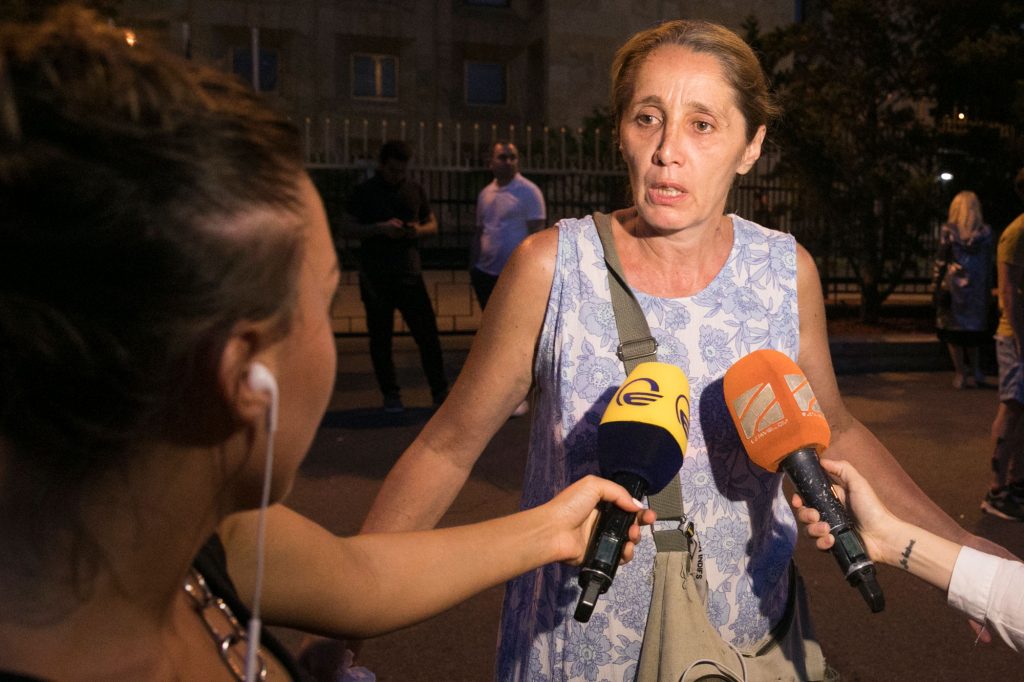
Nata Peradze
Nata Peradze is a Georgian painter and environmentalist. In 2013, she founded Guerilla Gardening Tbilisi. The movement supports the idea of green development in the city. Besides clean-up and tree-planting events, guerilla gardeners express protest against implementing those urban and infrastructural projects, which, in their opinion, will further aggravate the ecological situation in the country.
“Initially, [on June 20] absolutely non-partisan organizations “Russia is an occupier” and “The Society for Spreading Freedom” called the rally, but suddenly we saw that the United National Movement took up the reins and launched quite aggressive actions there – that was absolutely unacceptable. On the second day, civic activists managed to mobilize and showed very good skills of self-organization, which was proven again during the subsequent days of protests.
It is very appropriate, that the organizers have three specific demands, not to disperse the focus. It is also good that the protest rallies begin at 7pm every day, so that people can come at an established time, as if they were coming to work. It is the same as work, it is our work of building the country, and this helps citizens feel engaged in country’s life.
This is the protest with no clearly identified leader or one, political party inspiring it. It is the point agreed between civic movements and political parties. It will move our state to a new track – we are no longer dependent on a single political idol.
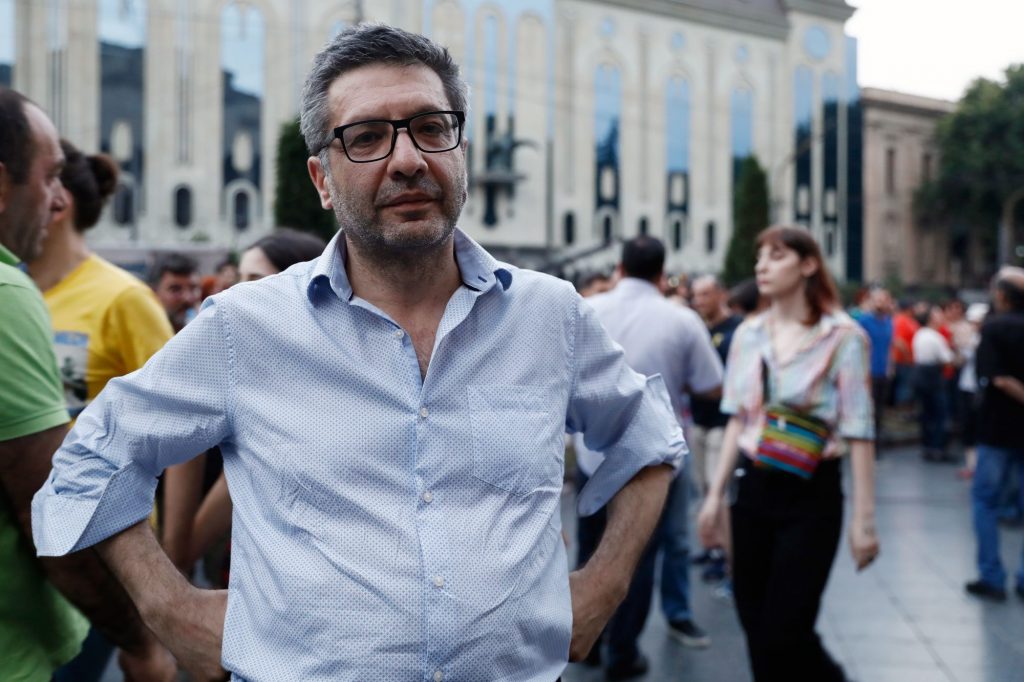
Lasha Bakradze
Lasha Bakradze is a Doctor of Philosophy. Since 2009, he has been Professor at Ilia State University. Starting 2010, he has been the Director of G. Leonidze Museum of Literature.
“The society expressed outrage at the arrival of Russian lawmakers in Georgia and their friendly reception [by the government], including in the presidential palace – in a manner that was befitting the representatives of friendly states, rather than of the country, which has occupied Georgian territories, which permanently stages provocations, pursues a policy of creeping annexation to grabs our lands.
That was alarming. But they really took to the streets after the ruling party members offered the chair of the Parliament Speaker to Russian lawmaker Gavrilov, who is known for his communist-fascist rhetoric.
It irritated the public and prompted them to gather at a large rally, which was later dispersed in the harshest manner.
A lot of young people were participating in the protest movement and through they [the government] want to portray these young people as supporters of a particular political party, their absolute majority do not belong to any party and are unlikely to vote for them either.
What we see is a great outrage of the wide spectrum of society.”
This post is also available in: Русский
